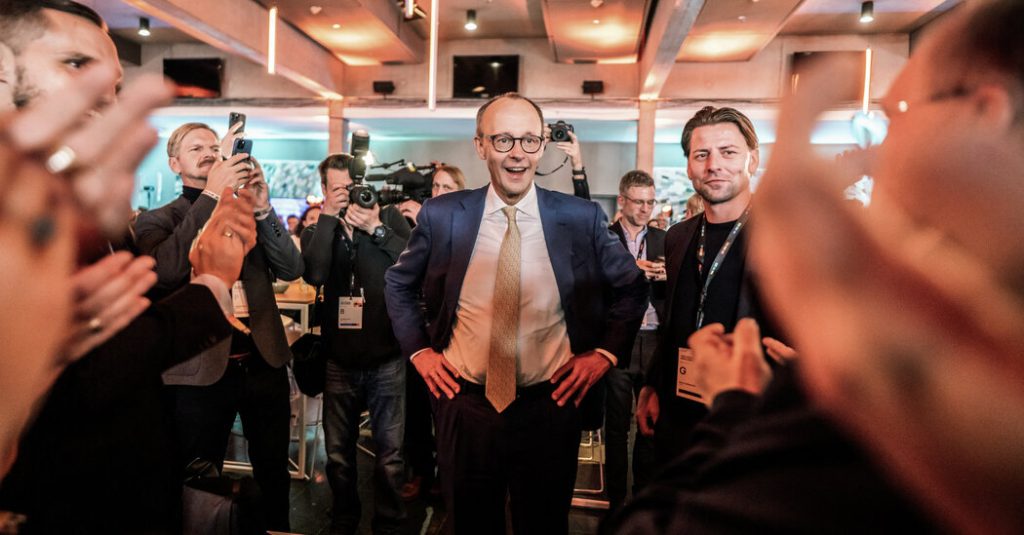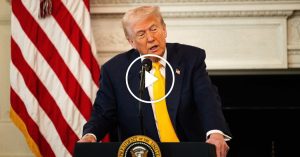Friedrich Merz, the man favored to be Germany’s next chancellor after elections on Sunday, is a conservative businessman who has never been a minister and was forced out of government years ago for challenging then-Chancellor Angela Merkel.
As a Christian Democrat and committed trans-Atlanticist, he has been considered a potentially better match for President Trump than the current Social Democratic chancellor, Olaf Scholz. He is also expected to lead a foreign policy more aligned with Mr. Trump’s ideas about Europe’s taking responsibility for its own defense.
But recent comments by Mr. Trump and Vice President JD Vance have displayed just how difficult any partnership may be with a United States that is less reliable and possibly hostile, and sympathetic to Russia’s narrative on Ukraine and spheres of influence.
That challenge is especially profound for Germany, and after Sunday is likely to fall on Mr. Merz, 69, who is known to be assertive and direct, if a bit awkward.
He pushed back strongly against Mr. Trump’s latest comments siding with Russia, as well as what was seen as interference in Germany’s election by Mr. Vance when he criticized Europe for sidelining far-right parties at the Munich Security Conference last week.
Speaking Tuesday night in Halle, Mr. Merz described a new contest between democracies and autocracies and spoke of “an epochal rupture” with the United States. “We see in America a president who admires autocratic systems and rides roughshod over all kinds of norms,” he said, and a “vice president who tells us how to run our democracy.”
Today he said, “we are no longer sure if the Americans still stand by our side as they did after 1945,” or “whether we can still rely on the Americans.”
Mr. Merz was also sharply critical of Mr. Vance’s intervention and had earlier defended German democracy and restrictions on hate speech. He accused Mr. Vance of “intervening quite openly in an election.” He slammed Mr. Trump’s trade policies, including threats of broad new tariffs on European goods and services.
That boldness is characteristic of Mr. Mertz, analysts say, and reflects a worldview that aspires to a Germany that is more forcefully engaged in European and global affairs. Mr. Scholz, on the other hand, has often been criticized for his tentativeness and caution, even from within his own coalition.
Mr. Merz has vowed to carve out a more prominent German role inside the European Union and NATO, to pursue better relations with France and Poland, and to take a tougher stance against China, which he has described as a full member of the “axis of autocracies.”
He has also promised more forthright support for Ukraine’s battle against Russia and that Germany will meet and surpass the current NATO target of 2 percent of gross domestic product being spent on the military. And he wants his ministers to be able to speak reasonable English.
“I fully agree with all those who are demanding more leadership from Germany,” Mr. Merz has said. “And I am willing to do that.”
The bluntness of Mr. Merz would benefit Germany, argued Noah Barkin, a senior adviser at the Rhodium Group, a geopolitical advisory firm, particularly at a moment when Europe’s security environment is rapidly changing.
“Scholz is extremely risk averse, a waffler, and Merz speaks in a clearer language, whether it’s on Russia or China,” Mr. Barkin said. “Scholz would never describe Russia, China, Iran and North Korea as an ‘axis of autocracies,’ and I wouldn’t underestimate that.”
Mr. Merz wants a single clear voice from the new government, Mr. Barkin said. “That won’t be easy in a coalition government or with the E.U.’s 27 member states, but the commitment is half the battle.”
Guntram Wolff, an economist and former head of the German Council on Foreign Relations, worked on a foreign-policy paper for Mr. Merz’s party. “There is a clear pro-European stance,” he said.
There is also “a clear understanding about Russia and Russian imperialism, that peace and freedom can only be sustained against Russia, not with it,” he added.
In a recent foreign-policy speech at the Körber Foundation, Mr. Merz, a former member of the European Parliament, promised to provide German leadership in Europe, which has not been a priority for Mr. Scholz, and to establish a national security council in the chancellery.
“I have been advocating that we do our own homework here in Europe in view of Donald Trump’s return to office, rather than sitting like a rabbit in front of a snake,” he said. “If we want to be taken seriously as equals, we as Europeans must put ourselves in a position to take responsibility for our own security.”
But given the compromise nature of German coalition politics — which may again require a three-party coalition after Sunday’s election — it’s also not a given that “the tougher rhetoric will lead to concrete changes in policy,” Mr. Barkin cautioned.
While German foreign policy is increasingly made inside the chancellery, traditionally a coalition partner demands to head the foreign ministry. Many expect that main partner to be the dovish Social Democrats, not least because their strength in the upper house of Parliament will be needed for any constitutional change on debt levels, which would make it far easier to increase military spending.
But given the conflicting ambitions on Ukraine of the possible coalition partners, some fear the resulting policy could be as muddled as that of the last government’s.
Mr. Merz has been more forward-leaning on the need for greater German support for Ukraine, saying, for instance, that he would provide Ukraine with Germany’s long-range cruise missile, the Taurus.
That is something that Mr. Scholz has steadfastly refused to do, fearing it could provoke Russia. The Scholz formula for Ukraine has been that Russia must not win and Ukraine must not lose, which has been seen as a recipe for stalemate. Mr. Scholz has said he will not serve in a Merz cabinet, but another Social Democrat in the foreign ministry might be just as inclined to keep that policy.
Mr. Merz has not ruled out deploying German troops to secure a peace settlement in Ukraine, but he has been cautious, insisting that first there must be a coordinated European response, agreement from Moscow and a clear legal mandate.
“On paper, Merz looks and sounds like he would be clearer in his foreign policy, in defense and in his political and military support for Ukraine,” said Claudia Major, a foreign and defense analyst with the German Institute for International and Security Affairs. “But he must deal with his coalition partner, the economic situation and the Trump administration, and all this will limit his space for maneuver.”
Germany’s low economic growth could restrain any large increase in military spending, but a loosening of the constitutional debt brake, which Mr. Merz has promised, would create more fiscal space to do so.
As for China, given the importance of German exports there and Mr. Merz’s reputation as a supporter of free trade, few expect major changes to raise barriers to Chinese imports or to institute tougher investment screening or export controls.
“There will be changes in substance, but on the margins,” Mr. Barkin said. “And Merz will have trouble navigating Trump, but as a pro-American businessman he’ll be in a better position than Scholz.”








